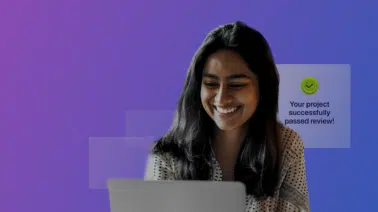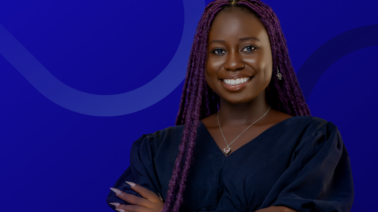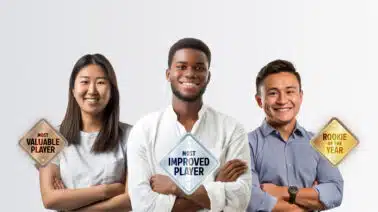 To say we at Udacity are huge fans of Affectiva CEO Dr. Rana el Kaliouby is a serious understatement, so it was with great delight we discovered she feels the same way about us! In advance of her appearance at our Intersect 2017 conference, I had the opportunity to talk with Dr. el Kaliouby. We discussed her motivations for participating in the conference, Affectiva’s mission to bring emotional intelligence to the digital world, new career opportunities in AI, and more.
To say we at Udacity are huge fans of Affectiva CEO Dr. Rana el Kaliouby is a serious understatement, so it was with great delight we discovered she feels the same way about us! In advance of her appearance at our Intersect 2017 conference, I had the opportunity to talk with Dr. el Kaliouby. We discussed her motivations for participating in the conference, Affectiva’s mission to bring emotional intelligence to the digital world, new career opportunities in AI, and more.
When I asked about her connection to Udacity, she was quick to label herself an advocate. She highlighted our mission of democratizing education, and cited her own life and career as an example of why personalized learning opportunities at a global level are so important:
With Udacity, people all over the world, with different backgrounds, different interests, different objectives, are able to receive a personalized education experience. I come from the Middle East. I’m Egyptian. I firmly believe that the solution to this region’s problems is access to education, and it’s not going to come from traditional schools. Technology is going to be a big part of the solution, and this is why I’m a huge advocate of Udacity.
Dr. Rana el Kaliouby’s career narrative begins in Cairo, where she earned her Master in Computer Science from the American University in Cairo. From there she went to Cambridge, and earned her Ph.D at the Computer Laboratory of the University of Cambridge. Then it was on to MIT, where she became part of the Affective Computing group at the MIT Media Lab. This ultimately led to her co-founding the company where she is now CEO, Affectiva.
As pioneers in the field of what Dr. el Kaliouby terms “Emotion AI,” Affectiva is at the very forefront of a technological movement that will dramatically reshape the future of technology and employment, and which stands to redefine how humans relate to—and work with—both machines, and each other. In a blog post at the end of 2016, she described Emotion AI in this way:
Emotion AI, short for artificial emotional intelligence, underscores that machines, like humans, need emotional intelligence to be most effective. This is especially true today in a world where technology is becoming more and more conversational, perceptual and relational.
We talked at length about the future of these technologies, and what this future looks like for Udacity students currently mastering skills in fields like AI, Deep Learning, and Self-Driving Cars:
The good news is that there is SO much work to be done! AI is very quickly becoming mainstream, the employment landscape is a green field, and Udacity students are at the forefront of these technologies.
One of the most interesting things to consider is that, as we see continued growth in “conversational interfaces,” these interfaces are going to need more and more specialized skills. Many bots, for example, are built to be “assistants,” but if you’re going to rely on them, you need to be able to “trust” them, so what does this trust relationship look like in this new paradigm? This is one example of why we’ve put our Emotion SDK and APIs out there for free, because we want to see what people will build, and we want them to be able to prototype rapidly, as they pursue new ways to emotion-enable their digital experiences and their products.
Making their SDK and APIs free to developers, and to any company that earns less than a million dollars a year, is just one example of their globally-minded evangelism; the company has also organized its own hackathon, hosted the first-ever online Emotion AI Developer Day, and sponsored other hackathons around the world.
As we moved further into discussions around global opportunity, we talked specifically about diversity—its importance, and its impact:
With our SDK, for example, it may be the same for everyone, but what gets built is always going to be a little different, and different developers around the globe are going to see things differently, and have different ideas. We live in a global world, and being a part of diversity is both a privilege and a responsibility, and we need to push to be a part of diversity, not fear it.
Dr. el Kaliouby also explained that even as we’re moving towards deep learning, the work is still just as human intensive—choosing data, making decisions on how to train data, what to train for, what the ethical implications are, and more. She noted that in the field of Emotion AI, “our algorithms are actually more accurate when we can train using diversity.”
I asked Dr. el Kaliouby about the role an organization like Udacity can play in promoting diversity, and preparing aspiring learners from different backgrounds and locations for careers in these exciting new arenas:
I really see Udacity as a critical reskilling platform in the context of AI’s impact on the employment landscape. If I’m a truck driver, for example, I can see that in 5 years I might not be able to be a truck driver anymore, but I can also see how I can use my experience, combined with new skills, to become a really important part of a team that’s working towards automating trucking services.
In particular we talked about the extent to which passion, motivation, and independent initiative play a role with regards to the kind of talent Affectiva is on the lookout for:
We certainly look for knowledge and depth of experience, but passion and motivation are equally important, and Affectiva is definitely on the lookout for people who have these qualities; we want to meet them, engage with them, and find ways to work together.
It is almost impossible to express how excited we are to have Dr. el Kaliouby at Intersect 2017. Her vision is both technically advanced and philosophically nuanced. Her work is groundbreaking, and her impact unmistakable. With a conference theme focused on Learning for the Jobs of Today, Tomorrow, and Beyond, Dr el Kaliouby is an absolutely ideal speaker, and we know with certainty every attendee will come away motivated, moved, and informed.
~
Learn more about Udacity’s Intersect 2017 conference here, and make sure to bookmark the livestream here!



